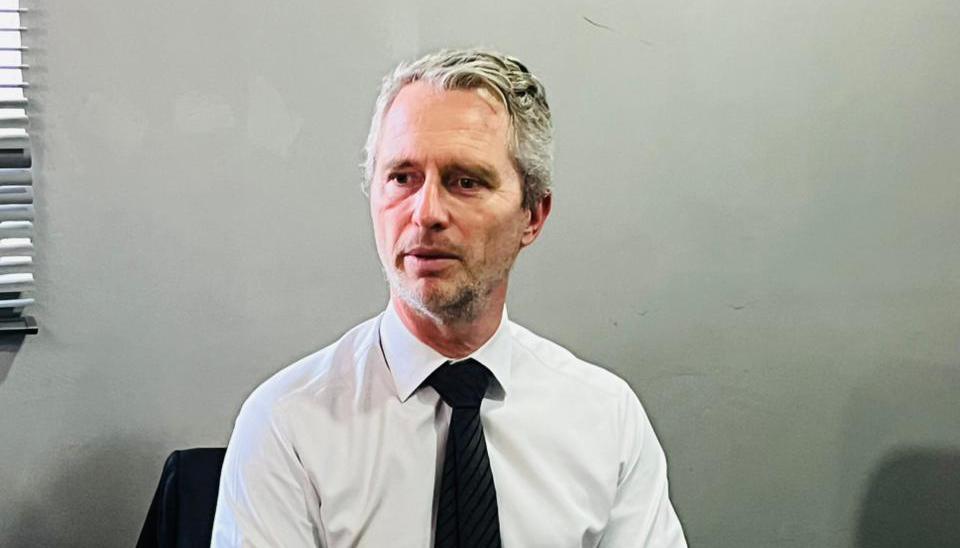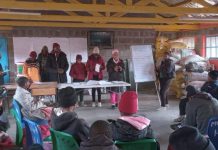Africa-Press – Lesotho. The French Ambassador to South Africa, Lesotho and Malawi, David Martinon, who is based in Pretoria, has been working to strengthen France’s diplomatic and development ties with the three countries since his accreditation to Lesotho in 2023.
On his official visit to the Kingdom this week, Ambassador Martinon sat down with the Lesotho Times for an exclusive conversation that touched on the rich 200-year-old history between France and Lesotho, the evolution of their partnership, and the possibilities for future collaboration.
He spoke passionately about the need for Lesotho to build a predictable business environment that would attract French investors, and highlighted France’s commitment to supporting the Kingdom in agriculture, renewable energy, education and gender equality issues.
From historic missionary ties at Morija to modern-day development cooperation, Ambassador Martinon’s visit reaffirmed France’s enduring friendship with Lesotho—and its vision of a partnership built on stability, innovation, and shared prosperity.
Excerpts:
LT: Let’s start from the beginning — the relations between France and Lesotho date back to 1833 and have grown over the years. Could you please take us through the origins and development of this relationship?
Martinon: It is already a joint history of almost 200 years. The origins of this friendship have largely been detailed in the film The Kingdom in the Sky, Moshoeshoe’s strategy and legacy released last year in commemoration of Lesotho bicentenary.
French missionaries helped shape King Moshoeshoe’s foreign policy during the protectorate era. At that time, Eugène Casalis could not provide diplomatic advice to the King because he had left the country after the death of his wife, who was buried in Morija.
When he returned to France, relations between Lesotho and the Cape Colony were tense. Casalis reached out to the French Emperor, who was in touch with Queen Victoria, and lobbied for the independence and autonomy of the Kingdom.
We love this story because these three young French missionaries, barely 20 years old, came to Southern Africa not out of colonial ambition, but out of universalism. They were deeply convinced that they needed to fight against slavery, and they frequently travelled between Lesotho and the Cape Colony to advocate against it.
They were not intending to stay in Lesotho; they were just crossing through. But when King Moshoeshoe heard about them, he sent members of his family to bring them to him. The Catholics later came, and from there our relationship continued to grow.
The latest highlight of this relationship was when King Letsie III travelled to France in March as the African Union Champion for Nutrition. He opened the Nutrition for Growth Summit in Paris and was received by President Emmanuel Macron. They had a very good meeting, and that is why I visited His Majesty this morning to follow up on that discussion and explore how we can push our joint projects forward.
We also have a centre mission in Morija, where we are working to protect the Museum Archives so that they are not lost. The aim is to make the archives accessible, properly sorted, organized, and digitized.
We also want to ensure that these archives are not only Morija’s archives, but that they include records of Lesotho’s involvement and sacrifices during the World Wars, so they can be used by artists and researchers. We believe these stories are important and deserve to be told and preserved. We have managed to secure funding to digitize them.
LT: Thank you for that historical background. Now, let’s explore the business opportunities between the two countries. Is there any potential for a small country like Lesotho in exploring the European market?
Martinon: The European market is open. We have agreements with African countries, and that’s the conversation I had with the Ministry of Trade some time ago. There is potential.
LT: What do you think Lesotho needs to do to attract French companies to invest in the country?
Martinon: Again, it all comes down to predictability—clarity on processes, clarity on tax issues. We have companies here like CMA CGM Group, which opened its doors a month ago.
LT: In terms of the economy, is there anything that the Lesotho government can learn from France to boost our economy? We have long relied on the American market, whose future is uncertain. What can the government or the textile sector do to explore other markets?
Martinon: We just had a discussion with the local representative of CMA CGM Group, which is currently the third—soon to be the second—largest shipping company in the world. They operate out of Durban and manage shipping lines connecting Asia, Europe, and Africa.
He told us that a large portion of the goods they transport from Lesotho are from the textile industry. The tariff deal that Lesotho managed to negotiate with the US is actually not bad. It could have been much worse, but your leaders managed to strike a better deal than some other countries, including South Africa.
Yes, 15 percent might seem high, but it’s still sustainable for the textile industry in Lesotho.
Lesotho has stable, green energy, which is a major asset. Some companies have relocated to Kenya, but the reality is that Kenya does not have sustainable or constant power. Here in Lesotho, you do—and it’s green. That’s a strong competitive advantage.
Also, the country is stable and peaceful, and not far from Durban, which works in your favour. What the country should now focus on is creating a predictable business environment.
Companies hate unpredictability because it prevents them from planning and expanding. Once there’s stability and predictability in the business environment, investment will thrive.
LT: Can you kindly take us through the projects that are currently ongoing and those that have been completed with funding from the French government?
Martinon: The other big field we want to venture into is agriculture. That’s a conversation we’ve had several times with His Majesty, who is the African Union Champion for Nutrition.
There’s a farmers’ market held every first Saturday of the month (at Alliance Francaise in Maseru), and we’re working to make it a weekly event.
We’re defining a project to support innovation in agriculture and agro-industry. We are currently designing it, but the idea is to promote and select innovative and entrepreneurial projects in the field of nutrition.
Years ago, we created an agricultural institute with South Africa because we saw that about 25 percent of Lesotho’s population suffers from malnutrition. We believe expanding the scope of that agricultural institute to Lesotho could help strengthen local agricultural institutions and improve productivity.
We also have strong projects supporting NGOs, especially in the fight against gender-based violence.
We have been accompanying Kick4Life, supporting them in the past, and we plan to do so again soon. I visited them a year ago, and they are doing a great job with simple, effective methods that truly make a difference.
We’re also supporting another project led by People’s Matrix, which advocates for LGBTQI rights—raising awareness and promoting understanding of the rights of the LGBTQI community.
Additionally, we will soon appoint a French expert to the National Bureau of Statistics to help modernize its processes so the country can rely on better-quality data.
LT: Are there things that you think Lesotho can capitalise on to make it a top tourist destination?
Martinon: Several, indeed. Of course, the government needs to invest more in hospitality infrastructure—not just in Maseru but across the country.
Museums and cultural institutions are also critical. Lesotho has precious treasures, such as its rock art caves. We understand there are thousands of caves, but not all are known or mapped. There’s a need to document and protect them, because without protection, the paintings might disappear, be stolen, or be destroyed.
We also need to train tourist guides—and it would help if they could speak French to attract visitors from French-speaking countries.
Through French language lessons, the idea is to shape a programme that helps guides learn how to address and interact with tourists effectively.
LT: Most of our mountain tour guides are herders who are uneducated. How are you hoping to address that challenge?
Martinon: We’re working on the concept note right now; it’s still the beginning of the programme. But it’s something we can sit down and discuss, to see how we can design it to include different kinds of people, including those without formal education.
LT: France also has a programme with the National University of Lesotho (NUL). Can you tell us more about that?
Martinon: We work closely with the French Department at NUL. We also collaborate with the French Teachers’ Association of Lesotho, which has about 80 members.
We support exchange programmes, including sending teachers to France for language and teaching training. These initiatives are ongoing and supported by the French Embassy.
We also have the idea of creating another branch inside NUL, following the same business model—offering language lessons and training. We’re currently seeking additional support for that initiative.
LT: Finally, what would you say summarises the French view of Lesotho’s potential?
Martinon: Lesotho has stable governance, green energy, and untapped natural beauty—all strong foundations for growth. What it needs most now is a predictable, transparent, and business-friendly environment that gives confidence to both local and international investors.
Once that is achieved, there is no doubt that French companies and other European investors will be eager to explore opportunities in the Kingdom.
For More News And Analysis About Lesotho Follow Africa-Press






